Few people are innocent anymore about the drug business, legal and illegal.
What can still be shocking, though, are those moments when the money motive comes out in the open and undresses in front of you.
That’s what happened Aug. 31 in Arizona. On that day, Insys Therapeutics, a Chandler-based drug company, donated $500,000 to the campaign against the legalization of marijuana. It was by far the biggest donation on either side of that initiative.
What would motivate a small, publicly traded company to put in what is so far 41 percent of the anti-legalization campaign’s $1.2 million war chest? The company said its opposition was for safety.
“Insys Therapeutics has joined a broad alliance of elected officials, health-care organizations and business leaders in opposing Prop. 205 because it fails to protect the safety of Arizona’s citizens, and particularly its children,” the company said in a written statement.
The company goes on to argue that all medicines should be approved by the Food and Drug Administration and acknowledges working to develop some of its own cannabinoid-based products.
Some news coverage of the donation has focused on the company’s current business. For the moment, Insys only sells one product, Subsys, a sublingual spray for cancer patients containing fentanyl, a very powerful opiate.
Some have argued the company viewed legal marijuana as competition for that spray.
“They want to be able to push their far more addictive, far more harmful and far more dangerous opioid drugs,” said J.P. Holyoak, who chairs the committee supporting the initiative.
But that’s not the likely motive.
Insys’ overwhelming concern must be about the next drug in its pipeline, dronabinol, which is a cannabinoid — in other words, chemically similar to marijuana. The Food and Drug Administration approved this drug, going by the brand name Syndros, in July.
The company has stated explicitly in warnings to investors that if marijuana is legalized, dronabinol sales could suffer. In the company’s very first filing, before an aborted effort at an initial public offering in 2007, the company said this:
Irrespective of its potential medical applications, there is some support in the United States for legalization of marijuana. If marijuana or non-synthetic cannabinoids were legalized in the United States, the market for dronabinol product sales would likely be significantly reduced and our ability to generate revenue and our business prospects would be materially adversely affected.
In years since the company went public in May 2013, it has softened its language on the financial impact of legalization, saying in its 2015 annual report: “In addition, literature has been published arguing the benefits of natural cannabis, or marijuana, over dronabinol, and there are a number of states that have already enacted laws legalizing medicinal and recreational marijuana.”
In any case, the company could not be much more clear about its interest in the legalization debate. It may say it’s about public safety, but it looks financial.
As Mark A.R. Kleiman, director of the Crime and Justice Program at New York University’s Marron Institute of Urban Management, told me Tuesday: “They don’t want the cheap competition.”
That’s not to say the pro-legalization side is standing on pure principle either. Far from it.
In 2015, there were competing pro-legalization initiatives, one of which was much looser than the one we will be voting on in November. The Legalization and Regulation of Marijuana Act would have allowed 10 times as many dispensaries as the initiative does that we’re voting on and would have allowed more liberal growing of marijuana.
What we’re voting on, instead, amounts to a gift to existing medical-marijuana dispensary owners. The Regulation and Taxation of Marijuana Act only allows existing medical-marijuana dispensary owners to get licenses to operate marijuana stores for four years after the law goes into effect in 2017.
Until 2021, additional licenses will be issued only if the number of marijuana dispensaries is less than 10 percent of the number of Series 9 (liquor store) licenses in the state.
The dispensary owners, of course, are enthusiastically supporting the initiative. Among that campaign’s biggest donors has been a dispensary company called Healing Healthcare 3, which has donated $80,000.
But go down the donor list, and what you’ll mostly find is dispensaries and related companies giving money to a campaign that will help their businesses:
- Hydroponic Solutions: $25,000.
- Swell Farmacy: $10,000.
- Health for Life: $21,000.
- Zen Dispensary: $10,000.
So, no matter which way you vote, you can count on someone’s financial interest being served. A more compelling question may be whether this initiative represents the best way to legalize marijuana.
As Kleiman said, “The public has made up its mind about cannabis.” We’re going to legalize, now or later.
But just as important, he said: “It matters how we legalize.”





